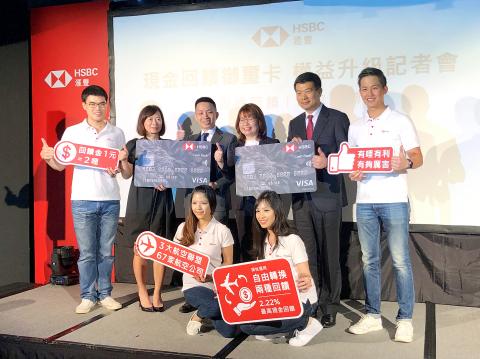HSBC Taiwan Ltd (匯豐台灣商銀) yesterday announced that it would bolster its cash rebate program for credit card holders to be more competitive in a saturated market.
Cardholders can exchange every New Taiwan dollar they earn from the bank’s cash rebate program for two airline miles, or use them to offset their next credit card bill, HSBC Taiwan retail banking and wealth management head Linda Yip (葉清玉) said.
“We want to give consumers more freedom and choice,” Yip said.

Photo: Kao Shih-Ching, Taipei Times
Few banks in Taiwan allow customers to exchange cash rebates for air miles, as banks tend to offer rewards in either airline miles or cash rebates rather than combining them, she said.
Given that the number of outbound travelers was 7.7 million in 2017, and people aged 20 to 65 accounted for 67 percent of the population, about 5 million Taiwanese qualify to apply for credit cards with airline miles incentives, HSBC said.
However, fewer than 1 million Taiwanese have applied for such cards, HSBC senior vice president Mike Huang (黃至弘) said, citing challenges such as requiring cardholders to redeem miles within a certain time frame.
“Taiwanese like money and traveling, so we combined the rewards,” Huang said, adding that the bank would not engage in pricing competition with the program.
HSBC said it has not set a time limit for air miles redemptions and would allow cardholders to redeem even a single mile.
“There is no minimum requirement,” it said.
If a cardholder has earned 14,902 miles, but needs 98 additional miles to redeem a flight ticket, they can use NT$49 in cash rebates to gain the 98 air miles, which is cheaper than buying air miles from carriers, Huang said.
The program would apply to the bank’s most popular card, the HSBC Cashback Signature Card, which offers cash rebates of 2.22 percent for overseas purchases and 1.22 percent for domestic transactions, the bank said.
It is cooperating with three airline alliances, SkyTeam, Asia Miles and Star Alliance, meaning cardholders can use air miles for tickets issued by 67 carriers, HSBC said.
Among the 29.42 million valid credit cards in Taiwan, those with cash rebate programs remain the most favorable, HSBC said.
Despite the competition becoming more fierce, the bank said it is confident that its differentiated services would succeed.

SEEKING CLARITY: Washington should not adopt measures that create uncertainties for ‘existing semiconductor investments,’ TSMC said referring to its US$165 billion in the US Taiwan Semiconductor Manufacturing Co (TSMC, 台積電) told the US that any future tariffs on Taiwanese semiconductors could reduce demand for chips and derail its pledge to increase its investment in Arizona. “New import restrictions could jeopardize current US leadership in the competitive technology industry and create uncertainties for many committed semiconductor capital projects in the US, including TSMC Arizona’s significant investment plan in Phoenix,” the chipmaker wrote in a letter to the US Department of Commerce. TSMC issued the warning in response to a solicitation for comments by the department on a possible tariff on semiconductor imports by US President Donald Trump’s

The government has launched a three-pronged strategy to attract local and international talent, aiming to position Taiwan as a new global hub following Nvidia Corp’s announcement that it has chosen Taipei as the site of its Taiwan headquarters. Nvidia cofounder and CEO Jensen Huang (黃仁勳) on Monday last week announced during his keynote speech at the Computex trade show in Taipei that the Nvidia Constellation, the company’s planned Taiwan headquarters, would be located in the Beitou-Shilin Technology Park (北投士林科技園區) in Taipei. Huang’s decision to establish a base in Taiwan is “primarily due to Taiwan’s talent pool and its strength in the semiconductor

Industrial production expanded 22.31 percent annually last month to 107.51, as increases in demand for high-performance computing (HPC) and artificial intelligence (AI) applications drove demand for locally-made chips and components. The manufacturing production index climbed 23.68 percent year-on-year to 108.37, marking the 14th consecutive month of increase, the Ministry of Economic Affairs said. In the first four months of this year, industrial and manufacturing production indices expanded 14.31 percent and 15.22 percent year-on-year, ministry data showed. The growth momentum is to extend into this month, with the manufacturing production index expected to rise between 11 percent and 15.1 percent annually, Department of Statistics

An earnings report from semiconductor giant and artificial intelligence (AI) bellwether Nvidia Corp takes center stage for Wall Street this week, as stocks hit a speed bump of worries over US federal deficits driving up Treasury yields. US equities pulled back last week after a torrid rally, as investors turned their attention to tax and spending legislation poised to swell the US government’s US$36 trillion in debt. Long-dated US Treasury yields rose amid the fiscal worries, with the 30-year yield topping 5 percent and hitting its highest level since late 2023. Stocks were dealt another blow on Friday when US President Donald